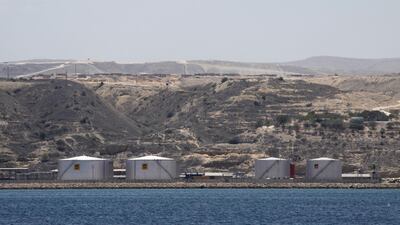One of the most difficult places in the world to get a visa for is Angola.
As collapsing oil production worsens the price slump, a new president is trying to sweep the country clean and open up a bureaucratic, state-run economy. In March, Luanda announced that it would offer visas on arrival for 61 countries including the UAE, one small sign of progress.
The south-west African country gets little attention, but it is the continent’s leading oil producer after Nigeria, and usually China’s second or third-largest oil supplier. It was badly hit by the 2014 collapse in oil prices, when its currency devalued sharply by about 40 per cent against the dollar, and has lost another 28 per cent since the start of this year. Inflation is high at over 20 per cent, and the budget deficit sizeable.
The country is budgeting on the basis of 1.7 million barrels per day (bpd) oil output this year, which it is unlikely to achieve. Higher prices will bail it out for now, but the outlook is gloomy. Following the price collapse, drilling almost dried up and has not revived since. Oil output, at its peak in 2008 at about 1.9 million barrels per day, slumped to 1.53 million bpd in April, 140,000 bpd below its Opec allocation.
That means after Venezuela, Angola is the largest contributor to Opec’s exceeding its target for cuts. Most of its production comes from deepwater fields developed in the early 2000s, which are now mature. Its high-cost oil has been one of the biggest victims of a combined onslaught from US shale and Saudi Arabia’s flirtation with a price war in 2014-16. Luanda’s Opec colleagues will be privately glad that its falling output eases their task. The country, of course, benefits from the pact when it cannot produce above its allocation anyway.
Little relief is in sight: French major Total’s ultra-deepwater Kaombo field will start up in the middle of this year, and keep output flat into next year, but decline will resume after that. Angola’s first liquefied natural gas exports began in 2013 but the plant was shut down repeatedly during 2014-16 due to technical problems. Onshore exploration was off-limits during the 1975-2002 civil war and hampered thereafter by remaining land-mines. A plan to offer areas on-land was cancelled last year and has not resurfaced.
With most production from the north, the country had hoped for major finds from the Kwanza basin, off the central part of the country. This might be the geological twin of Brazil’s famous Santos basin with its giant pre-salt oilfields, separated from the Kwanza by the opening of the Atlantic Ocean. But results so far have been disappointing.
Only Cobalt, a US firm, enjoyed success, finding seven fields in the Kwanza. But it then ran into trouble as state oil company Sonangol backed out of a deal to buy the assets in 2015. Cobalt declared bankruptcy in December over the dispute, before finally reaching a settlement. Now Sonangol, lacking the finance to develop the fields itself, is trying to sell them.
_______________
Read more:
US approach to sanctions puts oil market at risk
Opec’s grand bargain on output is at risk of becoming a victim of its own success
_______________
Amid these financial struggles, Angola has also negotiated a transfer of power. João Lourenço took over as president in September from incumbent José Eduardo dos Santos, who had held the post for 38 years. Although an insider from Mr dos Santos’ party, Mr Lourenço has set about cleaning up corruption. He dismissed Isabel dos Santos, the former president’s daughter and, coincidentally, Africa’s richest woman as head of Sonangol, and his son, Jose Filomeno dos Santos, as chief of the sovereign wealth fund. Jose dos Santos has been charged with a $1.5 billion fraud.
The crackdown has gone further than most Angolans expected. Still, it is early days; the new president could still run into opposition from other members of the elite, may halt at merely cosmetic changes, or may seek to redirect the wealth to his own circle. Alongside graft, the economy suffers from currency controls, bureaucracy and capricious taxation.
With no signs of a rebound in the oil business, Luanda needs to kick-start other sectors. The country is a leading diamond producer, has previously mined iron ore and has many other resources including agricultural land, hydroelectric power potential and untapped tourist attractions.
Angola’s experience may be relevant for other resource-dependent countries across Africa. Its Portuguese-speaking peer on the other side of the continent, Mozambique, also endured a lengthy post-colonial civil war. After making large gas discoveries, it took on undisclosed debts, then defaulted. It is yet to start production.
Nigeria, the continental powerhouse, has come through a painful recession and a halving in value of its currency. Unlike Angola, it has been able to increase oil production and has scope for more, as well as the potential of its huge gas resources, but the non-oil economy is still struggling. However, it is far more diversified than Angola. Conversely, Gabon, Equatorial Guinea and the Republic of Congo, all ruled by long-time leaders or dynasties, are even more dependent on oil than Angola.
Mr Lourenço faces a tough task: reviving investment in the energy sector; continuing the anti-corruption drive; and transforming the rest of the economy. At least his challenge is clearer than for other countries whose oil industries are still growing.
For Luanda, diversification is an imperative, not a choice.
Robin M. Mills is CEO of Qamar Energy, and author of The Myth of the Oil Crisis


